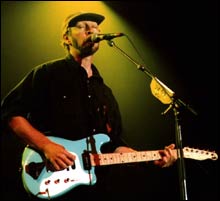 Richard Thompson’s fans can be a bit smug about the singer/guitarist’s ongoing failure to achieve a commercial breakthrough. The thinking is that the very elements that make him special — his roots in English folk, his conversion to Sufi Islam in the early ’70s, his literate songwriting, and, above all, his famously dark world view — would scare away a mass audience.
Richard Thompson’s fans can be a bit smug about the singer/guitarist’s ongoing failure to achieve a commercial breakthrough. The thinking is that the very elements that make him special — his roots in English folk, his conversion to Sufi Islam in the early ’70s, his literate songwriting, and, above all, his famously dark world view — would scare away a mass audience.
That’s the picture of Thompson offered on the new RT: The Life & Music of Richard
Thompson (Free Reed) — a five-CD set of nearly all unreleased material. Unlike Watching the Dark, Rykodisc’s three-disc collection from 1993, RT is more a massive odds-and-sods than a career wrap-up. It assumes you’re fan enough to excuse the varying sound quality and to tolerate almost an entire disc of live covers (from “Danny Boy” to “Oops! I Did Again”). And “Read About Love” and “When the Spell Is Broken,” two of the few Thompson songs ever to get commercial airplay, are MIA.
What’s here still makes a case for him as the classic rocker time forgot. If he never got the punters on his side, that’s partly because he released his heaviest albums — 1975’s post-conversion Pour
Down like Silver and 1982’s pre-divorce Shoot Out the Lights, both with then-wife Linda — just when people were starting to pay attention. When he finally got serious about a larger audience (with 1987’s Daring Adventures), he’d been marked as a folkie.
RT does give preference to Thompson’s acoustic side. But he used English folk the way Clapton and Page used the blues — as a springboard to an original rock-based style. And folk taught him to deal with the most personal subjects in universally resonant terms.
The set also debunks his image as a doom monger. That image stems largely from 1971’s “End of the Rainbow,” whose litany of complaints, though hardly uplifting, is actually so overstated it becomes humorous. Far more chilling is his early Fairport Convention tune “Crazy Man Michael,” a bleak take on trad English folk themes wherein a hero is tricked by a raven into murdering his lover. Thompson has always been up front about what prompted the song: it’s pure guilt therapy, written after most of Fairport survived a car accident that killed their drummer and his girlfriend.
But for every “Rainbow” or “Michael” (both here in recent live versions), there’s a “Crash the Party,” a raucous, hilarious Jerry Lee Lewis homage. The set reveals Thompson’s sense of humor more fully than any one album; it even opens with “Now That I Am Dead,” which imagines the deceased Thompson finally hitting MTV. Unfortunately missing is “I Agree with Pat Metheny,” the song he wrote after Metheny savaged Kenny G for overdubbing himself onto a Louis Armstrong recording. But it does have “Dear Janet Jackson” — not just the only song in his catalogue to include the word “titties” but the only song about her Super Bowl misadventure to be written in ’40s English music-hall style.
If there’s anything that could have elevated him to the arenas, it’s his guitar. Unike Clapton and Mark Knopfler, who started their careers with guns blazing, then got ever more tasteful, Thompson has grown as a guitar hero, soloing now more ferociously than he did in his younger days. The Free Reed box isn’t the best place to find such moments: his long-time live touchstone, “Tear Stained Letter,” appears only in a short acoustic version. Disc three, subtitled Epic Live Workouts, omits anything from the past decade. Its main jaw dropper is a version of the Fairport song “Sloth” taken from Richard & Linda’s famously tense 1982 break-up tour. The solo he plays is a beauty, full of biting yet lyrical phrases that build to a gorgeously cheap display of string-bending. It’s enough to make the most jaded snob reach for a lighter.
On the Web:
Richard Thompson: //www.richardthompson-music.com/